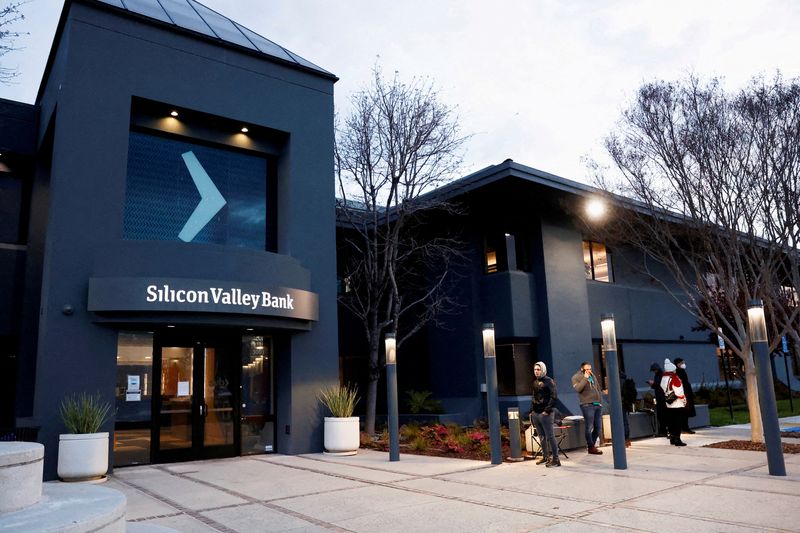Highlights from the Fed review of SVB oversight
2023.04.28 11:30

© Reuters. FILE PHOTO: Customers line up outside of the Silicon Valley Bank headquarters in Santa Clara, California, U.S. March 13, 2023. REUTERS/Brittany Hosea-Small
(Reuters) – The Federal Reserve issued a detailed and scathing assessment on Friday of its failures to identify problems and push for fixes at Silicon Valley Bank before the regional U.S. lender’s March 10 collapse, and called for stricter rules for banks.
Fed Vice Chair for Supervision Michael Barr called the review “unflinching,” describing the U.S. central bank’s oversight of the Santa Clara, California-based bank inadequate and regulatory standards too low.
Below are highlights from the report.
* Silicon Valley Bank was “acutely exposed” to risks from rising interest rates and slowing activity in the technology sector in ways that senior leaders and its board of directors did not appreciate. The bank failed its own internal liquidity stress tests.
* The culture at the Fed changed following the 2018 legislative rollback of banking regulations. This shift contributed to more lax supervision, staff said in interviews, citing pressure to reduce burdens on banks and provide more proof for their conclusions.
* In 2022, SVB failed to test its capacity to borrow at the discount window and did not have appropriate collateral and operational arrangements in place to obtain contingency funding.
* Fed supervisors discussed conducting an interest-rate risk review of SVB during 2022 but decided to prioritize other exams and defer it to the third quarter of 2023.
* The Fed’s supervision headcount declined by 3% from 2016 to 2022, even as banking sector assets grew by 37%.
* The level of Fed resources dedicated to its regional bank oversight “proved insufficient.” A single examiner was responsible for reviewing the bank’s interest-rate risk and investment portfolio, and in some cases, would also review liquidity and model risk management during a two-to-three-week timeframe.
* The Fed’s judgments of SVB were “not always appropriate” given the bank’s weaknesses. In one case, SVB’s governance and controls were downgraded to deficient only in August 2022 despite earlier signs that management and board oversight needed improvements.
* The Fed placed SVB on a list of banks with the highest ratio of unrealized losses relative to common equity tier 1 capital after a June 2022 special risk report.
* Fed officials initially recommended denying SVB’s 2022 request to make an investment in its London subsidiary due to supervisory issues, but ultimately dropped objections.








